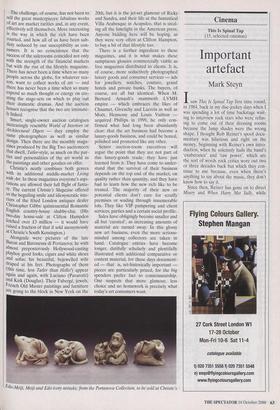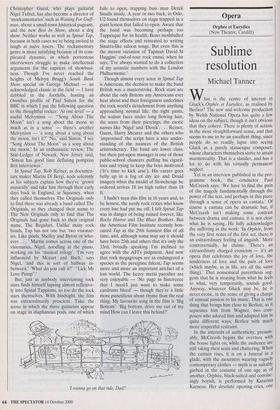Cinema
Important artefact
Mark Steyn
Isaw This Is Spinal Tap first time round. in 1984, back in my disc-jockey days when I was spending a lot of time backstage wait- ing to interview rock stars who were refus- ing to come out of their dressing rooms because the lamp shades were the wrong shape. I thought Rob Reiner's spoof docu- mentary was hilarious and right on the money, beginning with Reiner's own intro- duction, when he solemnly hails the band's `exuberance' and 'raw power', which are the sort of words rock critics wore out two or three decades back but which they con- tinue to use because, even when there's anything to say about the music, they don't know how to say it.
Since then, Reiner has gone on to direct Misery and When Harry Met Sally, while
Christopher Guest, who plays guitarist Nigel Tufnel, has also become a director of `mockumentaries' such as Waiting For Guff- man, about a small-town historical pageant, and the new Best In Show, about a dog show. Neither works as well as Spinal Tap, because in both cases we're being invited to laugh at naive losers. The rockumentary genre is more satisfying because of its com- plicated dynamic, in which portentous interviewers struggle to make intellectual arguments for the caprices of showbusi- ness. Though I've never reached the heights of Melvyn Bragg's South Bank Show special on George Michael — an acknowledged classic in the field — I have dabbled in the foothills, hosting an Omnibus profile of Paul Simon fOr the BBC in which I put the following question to the thoughtful rocker: 'At one level' — a useful Melvynism — "'Song About The Moon" isn't a song about the moon so much as in a sense' — there's another Melvynism 'a song about a song about the moon, isn't it?' No,' said Simon, 'I see "Song About The Moon" as a song about the moon.' In an enthusiastic review, The Star-Ledger of Newark, New Jersey said, `Simon has good time deflating pompous Brit interviewer.'
In Spinal Tap, Rob Reiner, as documen- tary maker Martin Di Bergi, nods solemnly as his subjects explain how they've 'grown musically' and take him through their early days back in England, in Squatney, when they called themselves The Originals only to find there was already a band called The Originals, so they changed their name to The New Originals only to find that The Originals had gone back to their original name, The Regulars. Unlike many rock bands, Tap has not one but 'two visionar- ies. Like poets. Shelley and Byron or who- ever ' Martin comes across one of the visionaries, Nigel, noodling at the piano, working on his 'musical trilogy'. 'I'm very influenced by Mozart and Bach,' says Nigel, 'and this is sort of halfway in- between.' What do you call it?' "'Lick My Love Pump": But, just as anybody interviewing rock stars finds himself lapsing almost reflexive- ly into Spinal Tappisms, so too do the rock stars themselves. With hindsight, the film was extraordinarily prescient. Take the scene in which the three guitarists appear on stage in diaphanous pods, one of which fails to open, trapping bass man Derek Smalls inside. A year or two back, in Oslo, U2 found themselves on stage trapped in a giant lemon that failed to open. Aware that the band was becoming perhaps too Tappesque for its health, Bono mothballed the stage effects and retreated to writing Sinatra-like saloon songs. But even this is the merest variation of Tapman David St Huggins' end-of-tour rock ennui, when he says, 'I've always wanted to do a collection of my acoustic numbers with the London Philharmonic.'
Though almost every actor in Spinal Tap is American, the decision to make the band British was a masterstroke. Rock stars are about the only Britons any Americans ever hear about and their foreignness underlines the rock world's detachment from anything approaching normal life: the tight pants, the walnut faces under long flowing hair, the sores from their piercings, the exotic names like Nigel' and 'Derek'. . Reiner, Guest, Harry Shearer and the others who `improvised' the script have a nice under- standing of the nuances of the British aristrockcracy. The band are lower class, but their put-upon manager is one of those public-school chancers puffing his cigaril- loes and trying to keep the boys motivated (It's time to kick arse'). His career goes belly up in a fog of dry ice and Druid imagery when the model of Stonehenge he ordered arrives 18 ins high rather than 18 ft.
I hadn't seen this film in 16 years and, to be honest, the nerdy rock critics who know every line had put me off. I felt Spinal Tap was in danger of being ruined forever, like Rocky Horror and The Blues Brothers. But the American Film Institute recently hon- oured Tap as the 29th funniest film of all time, and, although some may say it should have been 25th and others that it's only the 33rd, broadly speaking I'm inclined to agree with the AFI's judgment. And now that rock megagroups are as endangered a species as the peregrine falcon, Tap seems more and more an important artefact of a lost world. The heavy metal parodies are very enjoyable — 'No page in historeeee that I need/I just want to make some eardrums bleed' — though they're a little more punctilious about rhyme than the real thing. My favourite song in the film is 'Big Bottom': 'Big bottom, drive me out of my mind/How can I leave this behind?'
wanna go on that ride, Dad!'



















































































 Previous page
Previous page